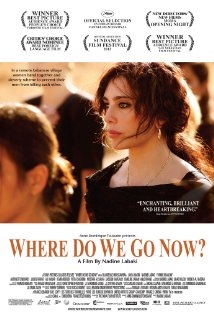Where Do We Go Now?

A group of Lebanese women try to ease religious tensions between Christians and Muslims in their village.
Director:
Nadine Labaki
Cast:
Claude Baz Moussawbaa, Leyla Hakim, Nadine Labaki |
Screenplay:
Rodney Al Haddid, Thomas Bidegain (collaboration), Jihad Hojeilly, Nadine Labaki, Sam Nessim
Screening Date:
May 05, 2012
| Excellent | Very Good | Good | Fair | Poor |
|---|---|---|---|---|
| 42.0% | 26.0% | 20.0% | 10.0% | 2.0% |
“A lovely fantasy. Nice if it could be reality.”
“If countries were ruled by women, there would be fewer wars, including the USA.”
“Why not just let women rule the world? Only problem who was doing the bad things against the other sides religion.”
“A hard to categorize film, part parable, part musical, part deadly serious drama, but consistently wonderful to watch. Ironic that such a slightly fantastic fable be presented by real people, not actors.”
“Who stole the shoes?”
“Media can be the savior of mankind, not the downfall. Religious fervor is the dark side of mankind, with the term Holy War being the most frightening two words ever spoken by man.”
“Too slow, but showed the power of women. They should rule the world.”
“Women to the rescue!”
“Lysistrata with a twist. Important topic and well done, if a bit choppy and confusing in places. Great mix of tragedy and comedy. A bittersweet rendition of a profound situation. The music was fantastic!”
“Not only does it take a village, it takes the women of the village (and some imports – ‘professional’ women) to bring peace and hopefully harmony.”
“Powerful film. Loved the opening with its blend of poetry, music, and choreography. I admire the screenwriter’s ability to incorporate humor into such a serious subject.”
“Women, especially mothers should rule the world.”
“Let them eat cake.”
“It’s not clear where the film is going in the beginning, but it builds to a powerful message at the end. Very imaginative. At once a gentle send up and an important statement.”
“The only answer that didn’t occur to the women - instead of converting just dump both religions. Arabic FIDDLER ON THE ROOF.”
“Why did they set up the TV? I thought it was going to be a special show like sports or singing competition featuring someone in their village, but it was nothing special. Took too long to get to swapping of religions. Would have preferred it get there earlier and explored that issue more. There seemed to be way too many Christian children of communion age for a village of that small size.”
“Engrossing film. I never lost interest.”
“Marvelous! Brilliant opening, right on! A well-crafted story. Women always have to endure. I love the way Nadine developed the strategies the women used to avert the men’s conflict. I would recommend this movie to everyone. “
“On a cynical note it is a nice fantasy of a solution because of all the world conflicts. I loved the musical and dance numbers interjected. (UMBRELLAS OF CHERBOURG). Men are from Mars, women from Venus.”
“Where do we go now? Well, obviously we leave it to the women!”
“At first I thought this might be like the UMBRELLAS OF CHERBOURG with the introduction of song to explain internal monologue of the star cross lovers, but then it shifted, not a musical, but with musical interludes. Not sure if it wanted to be a musical comedy or antiwar film fantasy? Good message: I love the switching religions at the end. Opening image of women was beautiful.”
“A welcome piece of magic realism. Excellent film with a (sadly) unlikely ending. I loved it on every level. How ironic that the precipitating offense - the breaking of the cross - was motivated by the desire to repair the television and not at all by religious divisiveness.”
“Enlightening! Less about religion than testosterone.”
“Loved the cause (who wouldn’t) but I found the script slow. The payoff at the end was worth it. Also one of the most potent and beautifully developed openings I’ve seen in a film in a long time. Thanks!” Jeanne K.
“I just loved this movie. Brought me both tears and laughter.”
"Great film, very creative."
“The village, Iman and priest were looking for miracles when the women were the miracles.”






